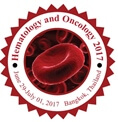
Murugan Avaniyapuram Kannan
King Faisal Specialist Hospital and Research Center, Saudi Arabia
Title: Phosphatidylinositol 3-kinase signaling pathway: The key to cell proliferation, migration and invasion in head and neck squamous cell carcinomas
Biography
Biography: Murugan Avaniyapuram Kannan
Abstract
PI3Ks are heterodimeric lipid kinases that regulate cellular activities such as proliferation, survival, motility and morphology through the second messenger PIP3. Studies have reported that the P110α (PIK3CA), the catalytic subunit of PI3-kinase is somatically mutated in human cancers. Here, we found PIK3CA mutations in 29.4% of head and neck squamous cell carcinoma cell lines, 10.5% of Indian, 11.7% of Japanese (unpublished data) and no mutation in Vietnamese tumors. Functional analysis of these mutations including a novel insertion mutation in Indian tumor showed increased PI3 kinase activities, followed by growth factor-independent proliferation, changes in morphology, a higher rate of cell migration and invasion. Our findings suggest that PIK3CA mutations in HNSCC are likely to be oncogenic and may significantly contribute to HNSCC carcinogenesis and pave an attractive target for therapeutic prevention.
As there were no mutations found in PIK3CA of Vietnamese oral cancers, we hypothesized that the RAS could be more likely activated as an upstream effector of PI3K. We, therefore, sequenced the exons 1 and 2 of H-RAS. The RAS mutations were detected in 10 of 56 tumors (18%) suggesting that RAS is an important member in the PI3K/Akt signaling and could play an important role in the tumorigenesis of oral carcinoma. SWAP-70 is a PIP3 binding protein involved in actin rearrangement, especially in membrane ruffling. Mouse embryo fibroblast (MEFs) deficient in SWAP-70 show impaired membrane ruffling and fail to grow on soft agar after transformation by v-Src. Here, we show that MEFs transformed by v-Src-expressing SWAP-70 are highly invasive. MEFs expressing SWAP-70 or v-Src alone were far less invasive, suggesting that both proteins were required for the cells to be invasive.

